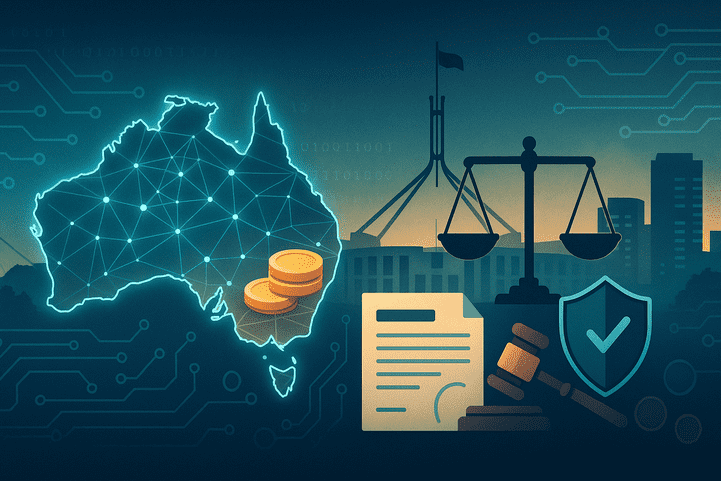Australia’s crypto industry backed the Australian crypto draft laws released last month. However, firms asked for clearer rules and faster guidance. The Treasury consultation opened in late September and closed on Friday.
The draft adds two categories to the Corporations Act: digital asset platform and tokenized custody platform.
Each category would need an Australian Financial Services License (AFSL) and ASIC registration. Therefore, Australia crypto regulation would sit inside existing financial law.
Yet industry leaders said clarity still lags. Caroline Bowler, former BTC Markets CEO, said:
“The draft legislation, as it stands, leaves some critical questions unanswered.” She added, “We support the government’s intent to bring structure to the digital asset sector. But structure must come with clarity.”
ASIC licensing standards: digital asset platform rules and custody expectations
The Australian crypto draft laws defer licensing detail to ASIC. The regulator would later set custody standards, platform obligations, and compliance controls. This places ASIC licensing at the center of the rollout.
However, companies said the deferral slows planning. Mandy Jiang, executive director and financial chief at CloudTech Group, called the approach a step forward while noting it delegates “many critical details” to ASIC. She said outcomes depend on the “timeliness and quality of ASIC’s forthcoming guidance.”
As a result, exchanges want dates and specifics. They linked investment decisions to ASIC licensing milestones for digital asset platform and tokenized custody platform requirements. Clear technical rules would help teams design systems and allocate capital.
Swyftx submission: simplify powers, define designations, allow offshore liquidity
Exchange Swyftx told the Treasury the Australia crypto regulation text needs “simplifying and clarifying.”
It said the bill grants a high level of Treasury discretion and allows regulators to impose major changes. Therefore, Swyftx asked for a statement to guide future regulatory interpretation.
Swyftx also asked to delineate Treasury and ASIC powers. The firm wants clear rules on who designates platforms and who sets minimum standards.
In its view, this split would reduce uncertainty for a digital asset platform license.
Moreover, Swyftx raised offshore liquidity. It said Australian crypto platforms need clarity on sourcing liquidity from foreign venues.
It also flagged advice rules, noting licensed financial advisers could not advise on individual cryptocurrencies, only on the regulated platforms that list them.
Jason Titman, Swyftx CEO, said the firm supports using financial services law while stressing consumer protection and a level field with international markets.
Caroline Bowler’s concerns: financial product test, market designation, multiple licenses
Caroline Bowler questioned how the bill will determine when a cryptocurrency is not a financial product.
She also asked how a digital asset platform could be treated as a financial market if it does not trade financial products.
“That’s a contradiction that needs resolution,”
she said.
She added that the bill appears to create multiple licenses without outlining the consumer benefit or the specific risks addressed.
This point places Australian crypto draft laws against a test of proportionality and clarity. Firms said they need to map cost to measurable safeguards.
According to Bowler, Australia crypto regulation should be fit for purpose. Otherwise, the framework could add burdens while not strengthening outcomes. Her focus remained on clear tests, clear scopes, and workable standards.
Timelines and politics: Treasury process, bipartisan signals, 2026 horizon
Assistant Treasurer Daniel Mulino introduced the Treasury consultation last month.
The government signaled intent to move the Australian crypto draft laws into a bill. Industry participants now wait for the next version that reflects submissions.
Crypto.com Australia general manager Vakul Talwar urged speed. He said the government should not ease pressure and suggested a bill could arrive as early as March.
He also said the file likely has bipartisan support, which may limit procedural delays once a bill is tabled.
Others see a longer road. Edward Carroll, head of global markets at MHC Digital Group, said “we probably won’t see legislation introduced before the end of 2026.”
He added that work remains to translate feedback into a workable bill. He noted that earlier clarity would let businesses plan with confidence under Australia crypto regulation.
What the draft covers today: AFSL, ASIC registration, platform scope
As written, a digital asset platform and a tokenized custody platform would both need an AFSL and ASIC registration.
The Australian crypto draft laws fold these activities into the existing regime. This puts ASIC licensing oversight over custody, conduct, and operational standards.
However, the draft still leaves tests undefined. Industry leaders asked how to test financial product status for cryptocurrencies, how to treat market-like features when financial products are not traded, and how multiple licenses align with specific risks. These requests aim at workable scoping.
Therefore, the next draft will be decisive. Clear definitions, clear ASIC rulebooks, and clear timelines would guide Australian crypto exchanges, financial advisers, and tokenized custody providers.
Firms said that alignment would support both compliance and competition under Australia crypto regulation.
Stay ahead in the crypto world – follow us on X for the latest updates, insights, and trends!🚀

Tatevik Avetisyan is an editor at Kriptoworld who covers emerging crypto trends, blockchain innovation, and altcoin developments. She is passionate about breaking down complex stories for a global audience and making digital finance more accessible.
📅 Published: October 27, 2025 • 🕓 Last updated: October 27, 2025


